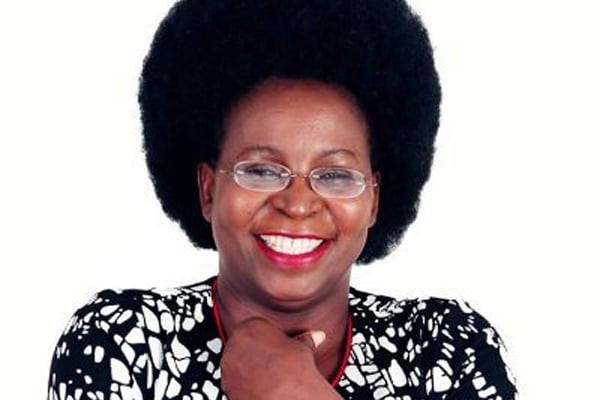Where are govt vaccines, cash for Covid-19?

Police chase a crowd off a street in Kampala City on June 19 following President Museveni’s ordering a 42-day countrywide lockdown to curb the spread of Covid-19. Owners of shops and arcades downtown found open were ordered to close. PHOTO/ABUBAKER LUBOWA
What you need to know:
- As the country battles a ruinous second wave of Covid-19 pandemic and another lockdown, questions are being asked on the whereabouts of billions of shillings and donations sunk into vaccines.
With a negligible 964,000 doses of AstraZeneca Covid-19 vaccines already used up, there is intensifying pressure on the government to find more Covid-19 vaccines as the best line of defense against the Covid-19.
By press time, June 20 figures showed a cumulative tally of 71, 543 Covid-19 cases, with 660 deaths, 1,026 admissions and 49,532 recoveries.
Although the country received 175,200 more doses last Wednesday, it was still a donation from France.
The government had earlier planned to buy 18 million Covid-19 doses of AstraZeneca from Serum Institute in India (SII), but it all hit a snag following high Covid-19 burden and demand in India as swathes of its population suffered ravages of the virus.
The vaccines from India were budgeted to be bought at $4 (about Shs14,000) a dose, but this might not be the same for other supplies at the moment.
However, Dr Diana Atwine, the Permanent Secretary in the Ministry of Health, said government had not wired any money to India before it suspended its export of vaccines to contain the surge in the sub-continent.
So far, all the vaccines that have been used in the country have come from donations, with government receiving 100,000 doses of AstraZeneca from Indian government on March 7, and another 864,000 doses as a donation from Covax on March 5.
Dr Atwine said the ministry first received Shs18 billion and a second instalment of Shs23 billion, totaling to Shs41 billion to buy Covid-19 vaccines. But all this has so far yielded nothing.
“We are now looking elsewhere… We are not in direct touch with manufacturers, we are using the African Union, Covax, and different other entities. We are not able to directly reach the manufacturers,” Dr Atwine said yesterday.
Asked how many orders for doses have been placed to different countries and with what manufactures, Dr Atwine said currently, they are not known because the government is still looking and engaging different entities and quantities of doses can be established after the orders have been confirmation.
Dr Henry Mwebesa, the director general of health services in the Health ministry said: “We don’t have any confirmation yet. We placed our request to the Covax facility. As soon as they get a firm offer, they will let us know how many doses have been offered.”
Even as there are several middle men willing to offer the vaccines, the Ministry of Health says they are expensive and cannot deal with them. The ministry says at least 4.8 million doses of vaccine are needed for top priority high-risk categories of people but the difficulty is with getting them due to current global shortage.

Health minister Jane Ruth Aceng (left) and French Ambassador to Uganda Jules-Armand Aniambossou (right) receive COVAX Covid-19 vaccines at Entebbe airport on June 16. PHOTO/PAUL ADUDE.
Health officials have accused developed countries of holding back the vaccines even when they have excess supplies.
When the vaccination campaign started in March, not many people responded for fear of the unknown.
Following the new coronavirus strains that are affecting even the younger age groups and those who didn’t have underlying illnesses, many have rushed for the jab.
A total of 869,915 people have been vaccinated, which accounts for 90.2 per cent of the 964,000 doses received.
Of these, 57,797 have received a second jab.
Uganda needs at least 45 million doses of vaccines for a population of over 22 million eligible people- and extra doses to cater for refugees.
Last month, the government transferred $11m (about Shs38.6b) to United Nations Children’s Fund (Unicef) for procurement of vaccines through Covax under the cost-sharing arrangement. This means there is balance left of Shs41b.
President Museveni, on Friday, during a televised address on the Covid-19 situation in the country, said additional 688,000 doses of AstraZeneca vaccines are expected into the country in early August. But he was not clear whether this would be a donation or government-bought vaccines.
“I have directed that these doses be prioritised to give second dose to those who have already got their first dose,” President Museveni said.
Currently, government is working with the Chinese embassy to bring in 300,000 doses of Sinovac vaccine donation from China and discussing modalities of acquisition of more vaccines through direct purchase.
Dr Atwine said apart from the above, there are no other doses confirmed yet but hope to get some answers by the end of the month.
“We are engaging the African Union and Africa Centres for Disease Control. They want to negotiate as one block for Africa,” she said.
By press time, Dr Atwine was unable to tell us the total budget of the vaccines as she didn’t have the figure off head.
In the coming financial year, the government has earmarked Shs560 billion for procurement of Covid-19 vaccines.
Some of the known donations
Donor Contribution
US PPEs ($1.87m)
IGAD $100,000
World Bank $300 million
Japan $1,640,442
IMF $491.5 million





